Evidence without a crime
REPORT: Mueller probe’s allegations could shift role of prosecution to Congress
By Devlin Barrett and Matt Zapotosky WASHINGTON POST
WASHINGTON — The report from Robert Mueller lays out abundant evidence against President Donald Trump, finding 10 “episodes” of potential obstruction of justice, but ultimately concluding it was not the special counsel’s role to determine whether the commander in chief broke the law.
Submitted to Congress on Thursday, the 448-page document alternates between scenes of presidential scheming and dense legal analysis, and it marks the onset of a new phase of the Trump administration in which congressional Democrats must decide what, if anything, to do with Mueller’s evidence.
The report suggests — though never explicitly states — that Congress, not the Justice Department, should assume the role of prosecutor when the person who may be prosecuted is the president.
“The conclusion that Congress may apply the obstruction laws to the President’s corrupt exercise of the powers of office accords with our constitutional system of checks and balances and the principle that no person is above the law,” Mueller’s team wrote.
Trump once feared Mueller could destroy his presidency, but the special counsel instead may define it.
By releasing a thick catalog of misconduct and mendacity that, if not criminal, is deeply unflattering, Mueller’s report may mean long-term political problems for a president seeking re-election next year.
Still, Trump’s electoral base has not been swayed by such stories in the past, and he already has claimed victory on the investigation’s bottom line: no conspiracy with Russia, no obstruction of justice.
Since Mueller ended his investigation last month, a central question facing the Justice Department has been why Mueller’s team didn’t reach a conclusion about whether the president obstructed justice.
The issue was complicated, the report said, by two key factors — the fact that, under department practice, a sitting president can’t be charged with a crime, and that a president has a great deal of constitutional authority to give orders to other government employees.
Trump submitted written answers to investigators. The special counsel’s office considered them “inadequate” but didn’t press for an interview with him because doing so would cause a “substantial delay,” the report says.
The report said investigators felt they had “sufficient evidence to understand relevant events and to make certain assessments without the President’s testimony.”
The members of Trump’s legal team declared Mueller’s report “a total victory” for the president.
It “underscores what we have argued from the very beginning — there was no collusion — there was no obstruction,” they said.
In their statement, Trump’s lawyers also attacked former leaders at the FBI for opening “a biased, political attack against the President — turning one of our foundational legal standards on its head.”
Trump said little publicly about the report’s release. At an event Thursday, he indicated he was having a “good day,” and adding that “this should never happen to another president again, this hoax.”
Ahead of the report’s release, the president lobbed a familiar attack on the investigation.
“PRESIDENTIAL HARASSMENT!” he tweeted. “The Greatest Political Hoax of all time! Crimes were committed by Crooked, Dirty Cops and DNC/ The Democrats.”
In the report, investigators paint a portrait of a president who believes the Justice Department and the FBI should answer to his orders, even when it comes to criminal investigations.
During a meeting in which the president complained about then-Attorney General Jeff Sessions’ decision to recuse himself from the Russia investigation, Trump insisted that past attorneys general had been more obedient to their presidents — referring to President John F. Kennedy and his brother, Robert, as well as Barack Obama’s administration.
“You’re telling me that Bobby and Jack didn’t talk about investigations? Or Obama didn’t tell Eric Holder who to investigate?” Trump said to senior White House staffers Stephen Bannon and Donald McGahn, according to the report.
“Bannon recalled that the President was as mad as Bannon had ever seen him and that he screamed at McGahn about how weak Sessions was,” the report said.
Repeatedly, it appears Trump may have been saved from more serious legal jeopardy because his own staffers refused to carry out orders they thought were problematic or potentially illegal.
For instance, in the early days of the administration, when the president was facing growing questions concerning then-national security adviser Michael Flynn’s conversations about sanctions with a Russian ambassador, Trump ordered another aide, K.T. McFarland, to write an email saying the president did not direct those conversations.
She decided not to do so, unsure if that was true and fearing it might be improper.
“Some evidence suggests that the President knew about the existence and content of Flynn’s calls when they occurred, but the evidence is inconclusive and could not be relied upon to establish the President’s knowledge,’” the report said.
The report also recounts a remarkable moment in May 2017 when Sessions told Trump that Mueller had just been appointed special counsel. Trump slumped back in his chair, according to notes from Jody Hunt, Sessions’ then-chief of staff.
“Oh my God, this is terrible. This is the end of my presidency,” Trump said.
The president further laid into Sessions for his recusal, saying Sessions had let him down.
“Everyone tells me if you get one of these independent counsels it ruins your presidency,” Trump said, according to Hunt’s notes. “It takes years and years and I won’t be able to do anything. This is the worst thing that ever happened to me.”
The special counsel’s report on possible coordination between the Trump campaign and Russians to interfere in the 2016 election is extremely detailed with only modest redactions — painting a starkly different picture for Trump than Attorney General William Barr has offered, and revealing new details about interactions between Russians and Trump associates.
Mueller’s team wrote that though their investigation “did not establish that the Trump Campaign coordinated with the Russian government in its election interference activities,” that assertion was informed by the fact that coordination requires more than two parties “taking actions that were informed by or responsive to the other’s actions or interests.”
And Mueller made it clear: Russia wanted to help the Trump campaign, and the Trump campaign was willing to take it.
“Although the investigation established that the Russian government perceived it would benefit from a Trump presidency and worked to secure that outcome, and that the Campaign expected it would benefit electorally from information stolen and released through Russian efforts, the investigation did not establish that members of the Trump Campaign conspired or coordinated with the Russian government in its election interference activities,” Mueller’s team wrote.
The report detailed a timeline of contacts between the Trump campaign and those with Russian ties — much of it already known, but some of it new.
For example, Mueller’s team asserted that in August 2016, Konstantin Kilimnik, whom the FBI has assessed as having ties to Russian intelligence, met with Paul Manafort, Trump’s campaign chairman, “to deliver in person a peace plan for Ukraine that Manafort acknowledged to the Special Counsel’s Office was a ‘backdoor’ way for Russia to control part of eastern Ukraine.”
The special counsel wrote that both men believed the plan would require candidate Trump’s “assent to succeed (were he elected President).”
“They also discussed the status of the Trump Campaign and Manafort’s strategy for winning Democratic votes in Midwestern states,” the special counsel wrote. “Months before that meeting, Manafort had caused internal polling data to be shared with Kilimnik, and the sharing continued for some period of time after their August meeting.”

